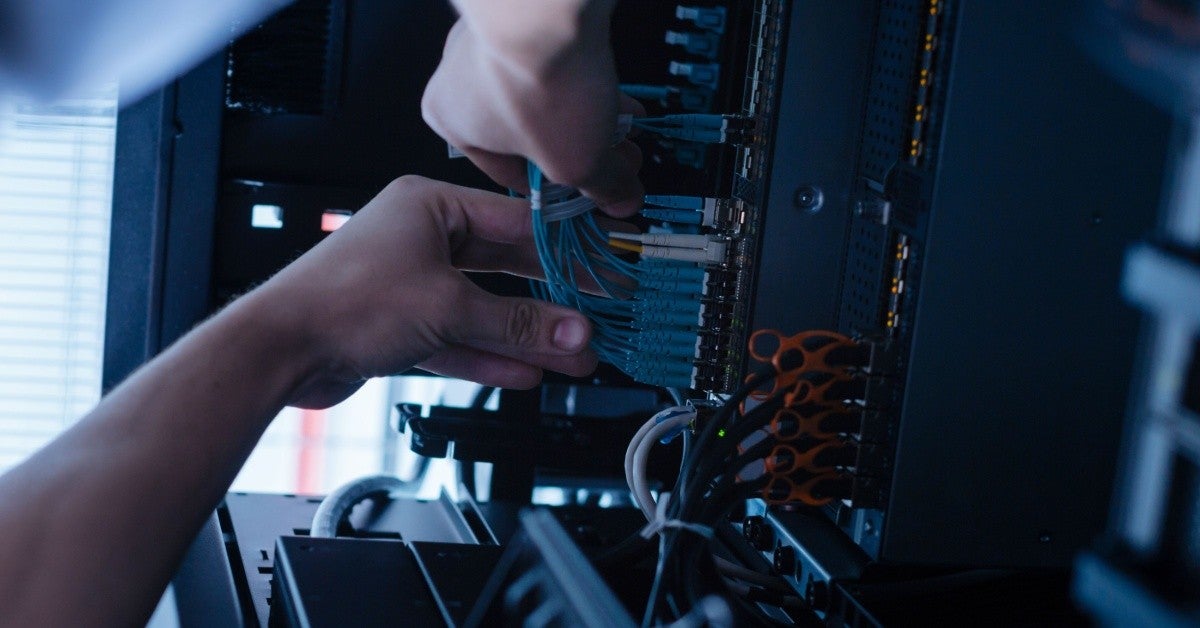In the ever-evolving landscape of cybersecurity, firewall hardware is essential for protecting networks from the increasing threats of cyberattacks. Unlike software firewalls that operate on shared system resources, hardware firewalls are standalone devices dedicated to filtering traffic, blocking unauthorized access, and safeguarding sensitive data. These devices are vital for organizations prioritizing robust and scalable network security.
This guide explores the top 10 hardware firewall devices, their features, and their importance for businesses aiming to fortify their cybersecurity defenses.
What Is Firewall Hardware?
Firewall hardware refers to physical devices explicitly designed to monitor and regulate network traffic based on predetermined security policies. Positioned between a private internal network and external networks such as the internet, these firewalls act as gatekeepers, ensuring only authorized data packets are allowed through while blocking malicious traffic.
Hardware firewalls are typically deployed at the perimeter of a network, offering a first line of defense. Unlike software firewalls that depend on the host system's resources, hardware firewalls provide dedicated processing power, which ensures high performance and reliability.
Hardware firewalls are a critical component of any cybersecurity strategy for businesses with complex networks or high data throughput requirements.

Why Businesses Need Hardware Firewalls
In an era of escalating cyber threats, hardware firewalls have become indispensable for businesses of all sizes. Unlike software-based solutions, firewall hardware offers a dedicated layer of protection that is reliable, scalable, and built to meet modern security demands. Here's why businesses should invest in hardware firewalls:
1. Dedicated Security
Hardware firewalls function as standalone devices, offering robust protection without burdening your system resources. This independence reduces the risk of system overloads or performance slowdowns, ensuring uninterrupted network operations. For instance, enterprise firewall hardware like Cisco Firepower delivers superior threat protection while maintaining optimal network performance.
2. Scalability for Growing Businesses
As businesses expand, their network traffic and security needs increase. Many hardware firewalls are designed to scale seamlessly, supporting higher bandwidth and additional traffic without compromising security. This scalability ensures that your network remains protected as your business grows.
3. Advanced Threat Protection
Modern firewall hardware integrates cutting-edge security features to combat sophisticated cyber threats. These include:
- Intrusion Prevention Systems (IPS) to detect and block malicious activity.
- Real-time threat detection powered by AI and machine learning.
- Advanced malware filtering to prevent ransomware and phishing attacks.
4. Regulatory Compliance Assistance
Many industries, such as healthcare and finance, must comply with stringent data protection regulations like GDPR, HIPAA, or PCI-DSS. Hardware firewalls play a critical role in achieving compliance by offering features like data encryption, access control, and detailed logging for audits. Solutions like Check Point Quantum are specifically designed to meet the needs of regulated industries.
5. Network Segmentation for Enhanced Security
One key benefit of hardware firewalls is their ability to segment networks. By isolating sensitive data or critical applications, businesses can minimize the risk of breaches spreading across the network. For example, Sangfor’s NGFW offers advanced segmentation capabilities, ensuring that sensitive areas of your network remain secure even if other parts are compromised.
Why Choose Hardware Firewalls Over Software Firewalls?
While software firewalls are suitable for smaller setups, they depend on host systems and can lead to performance bottlenecks under heavy load. In contrast, firewall hardware operates independently, offering superior reliability, faster processing, and enhanced protection for complex networks.
Top 10 Firewall Hardware Devices
Here are the top hardware firewalls leading the industry in 2024:
1. Sangfor Network Secure Next Generation Firewall by Sangfor
About the Solution:
Sangfor’s Network Secure Next Generation Firewall stands out as a versatile option for businesses that need real-time threat detection and AI-powered analytics to address modern cyber challenges.
Key Features:
- Application-layer filtering for precise traffic management.
- Intrusion Prevention Systems (IPS) to block malicious activity.
- Comprehensive traffic analysis with in-depth reporting.
Pros:
- Easy deployment and scalability.
- Tailored for enterprises of all sizes.
- Advanced AI-driven features for proactive security.
Cons:
- IT teams unfamiliar with AI-based tools may require additional training.
2. Cisco Firepower by Cisco
About the Solution:
Cisco Firepower delivers enterprise-grade security backed by advanced threat intelligence and seamless integration into Cisco's ecosystem, making it a go-to choice for global corporations.
Key Features:
- Next-generation intrusion prevention systems (IPS).
- Advanced Malware Protection (AMP) for deep file inspection.
- Integrated VPN support for secure remote access.
Pros:
- Highly scalable for large networks.
- Reliable and efficient threat detection.
Cons:
- Premium pricing may deter smaller organizations.
3. Palo Alto Networks PA-7000 Series by Palo Alto Networks
About the Solution:
Palo Alto’s PA-7000 Series offers unmatched performance for enterprises managing high data volumes, with advanced filtering and decryption capabilities.
Key Features:
- Application-based filtering for targeted control.
- SSL decryption to protect against encrypted threats.
Pros:
- High availability and exceptional scalability for demanding environments.
- Industry-leading performance metrics.
Cons:
- High costs and complex installation process.
4. Fortinet FortiGate 6000F Series by Fortinet
About the Solution:
Fortinet’s flagship hardware firewall is designed for critical networks that demand robust, multi-layered protection across various platforms.
Key Features:
- Secure SD-WAN integration to streamline branch connections.
- Multi-cloud security for hybrid environments.
Pros:
- Comprehensive features and excellent vendor support.
- Trusted by enterprise networks for reliability.
Cons:
- Configuration can be complex for non-experts.
5. WatchGuard Firebox (T35 and T55) by WatchGuard
About the Solution:
A compact and cost-effective firewall option for small and medium-sized businesses (SMBs) seeking essential protection.
Key Features:
- Built-in VPN for secure remote connections.
- Simple and intuitive web-based management.
Pros:
- Affordable pricing.
- Quick and straightforward setup.
Cons:
- Feature sets may not meet the demands of larger enterprises.
6. Sophos XG Firewall by Sophos
About the Solution:
Sophos XG Firewall enhances network and endpoint security through synchronized protection and AI-powered threat detection.
Key Features:
- AI-enhanced threat detection for proactive defense.
- Real-time analytics and detailed reporting.
Pros:
- Affordable for mid-sized businesses.
- User-friendly interface.
Cons:
- Can experience performance lags during high-traffic periods.
7. Netgear ProSAFE by Netgear
About the Solution:
Ideal for small-scale networks, Netgear ProSAFE combines simplicity with affordability, catering to businesses with limited budgets.
Key Features:
- Basic VPN functionality for secure remote access.
- Web-based configuration for easy management.
Pros:
- Budget-friendly options for SMBs and startups.
- Highly accessible for users with minimal technical experience.
Cons:
- Limited advanced threat detection capabilities.
8. Check Point Quantum by Check Point
About the Solution:
Check Point Quantum focuses on preventing sophisticated attacks through automated threat responses and multi-layered defenses.
Key Features:
- Zero-day attack protection to block emerging threats.
- Comprehensive, multi-layered defense strategies.
Pros:
- Perfect for high-security environments.
- Reliable performance under heavy loads.
Cons:
- Requires dedicated IT expertise for optimal use.
9. Bitdefender BOX by Bitdefender
About the Solution:
Designed for home users and IoT environments, Bitdefender BOX provides smart device security at an affordable price point.
Key Features:
- IoT-specific threat management for connected devices.
- Parental controls and device monitoring.
Pros:
- Compact and budget-friendly solution.
- Easy setup for non-technical users.
Cons:
- Not suitable for enterprise-level applications.
10. Netgate pfSense Security Gateway Appliances by Netgate
About the Solution:
Netgate’s pfSense appliances offer unmatched flexibility and open-source features for users who require highly customizable firewalls.
Key Features:
- Advanced routing protocols for network optimization.
- Fully configurable firewall policies to meet specific needs.
Pros:
- Adaptable for unique and complex network setups.
- Offers great value for experienced IT teams.
Cons:
- Steep learning curve for users unfamiliar with open-source tools.
Considerations for Selecting Firewall Hardware
Choosing the right firewall hardware is critical for protecting your network and ensuring operational efficiency. With many options available, it is essential to evaluate specific factors that align with your organizational needs.
Below are key considerations:
Scalability
Can the hardware firewall scale to meet your future growth? For instance, a small business might initially require a basic solution like Netgear ProSAFE but may need a more robust device like Cisco Firepower as it grows. Scalability ensures that your firewall hardware investment remains viable as your network expands.
2. Performance
Look for hardware firewalls that offer sufficient throughput and low latency to handle your current and future traffic loads. High-performance firewall hardware, such as the Palo Alto Networks PA-7000 Series, ensures smooth operations for enterprises managing high data volumes.
3. Security Features
Does the hardware firewall offer comprehensive protection? Features like intrusion prevention systems (IPS), malware filtering, and application-layer control are crucial. Devices such as Fortinet FortiGate 6000F Series excel in providing advanced, multi-layered protection.
4. Ease of Management
An intuitive user interface is vital, especially for businesses without dedicated IT teams. SMBs often benefit from user-friendly firewall hardware, like WatchGuard Firebox, which simplifies deployment and management.
5. Cost
The total cost of ownership includes the initial purchase, maintenance, and support. Entry-level hardware firewalls, like Bitdefender BOX, are budget-friendly for small businesses, whereas enterprise solutions, such as Check Point Quantum, may involve a higher investment.
By carefully weighing these considerations, businesses can choose the firewall hardware that best matches their operational and security needs.
Why Hardware Firewalls Are Essential for Modern Business Security
Investing in a hardware firewall is a vital step for businesses aiming to protect their networks, data, and operations from increasingly sophisticated cyber threats. Whether you are a small business seeking cost-effective solutions or a large enterprise requiring advanced scalability and robust security, the right firewall hardware can make all the difference. By understanding your organization’s specific needs, such as performance, scalability, and compliance requirements, you can select a firewall solution that ensures comprehensive protection.
For those seeking a reliable and innovative option, the Sangfor Network Secure Next Generation Firewall is an excellent choice. Designed to tackle modern cybersecurity challenges, it combines real-time threat detection, advanced malware protection, and unparalleled performance. To learn more and explore how Sangfor can help secure your business, visit our Sangfor Network Secure Next Generation Firewall product page.
Frequently Asked Questions
Firewall hardware refers to a physical device designed to protect your network by filtering traffic, blocking unauthorized access, and detecting cyber threats. Unlike software-based solutions, hardware firewalls operate independently, offering superior performance and reliability for larger, more complex networks.
For example, firewall hardware like the Sophos XG Firewall not only safeguards data but also synchronizes with endpoint devices for enhanced security.
A hardware firewall is a standalone device with dedicated resources, offering robust protection and better performance for high-traffic networks. In contrast, a software firewall runs on a host system, sharing its processing power, which can result in performance bottlenecks.
Businesses with heavy network demands typically prefer firewall hardware like the Sangfor NGFW, which can handle advanced threats without burdening other resources.
Yes, even small businesses benefit significantly from deploying hardware firewalls. Affordable devices like WatchGuard Firebox and Netgear ProSAFE are tailored for SMBs, offering essential protection against malware, unauthorized access, and other cyber threats.
For SMBs managing sensitive customer data, investing in a basic firewall hardware device is a cost-effective way to secure their operations.
The cost of hardware firewalls varies depending on the features and scale. When calculating the expense of firewall hardware, it is essential to consider long-term costs, including software updates, technical support, and hardware maintenance.
Absolutely. Modern hardware firewalls integrate AI-powered analytics, real-time monitoring, and advanced intrusion prevention systems to tackle sophisticated cyber threats.
Devices like the Fortinet FortiGate 6000F Series and Check Point Quantum are designed to counter zero-day attacks, ransomware, and other emerging threats, ensuring comprehensive protection for businesses of all sizes.
By investing in the right firewall hardware, organizations can stay ahead of evolving cyber risks while ensuring network stability and performance.





